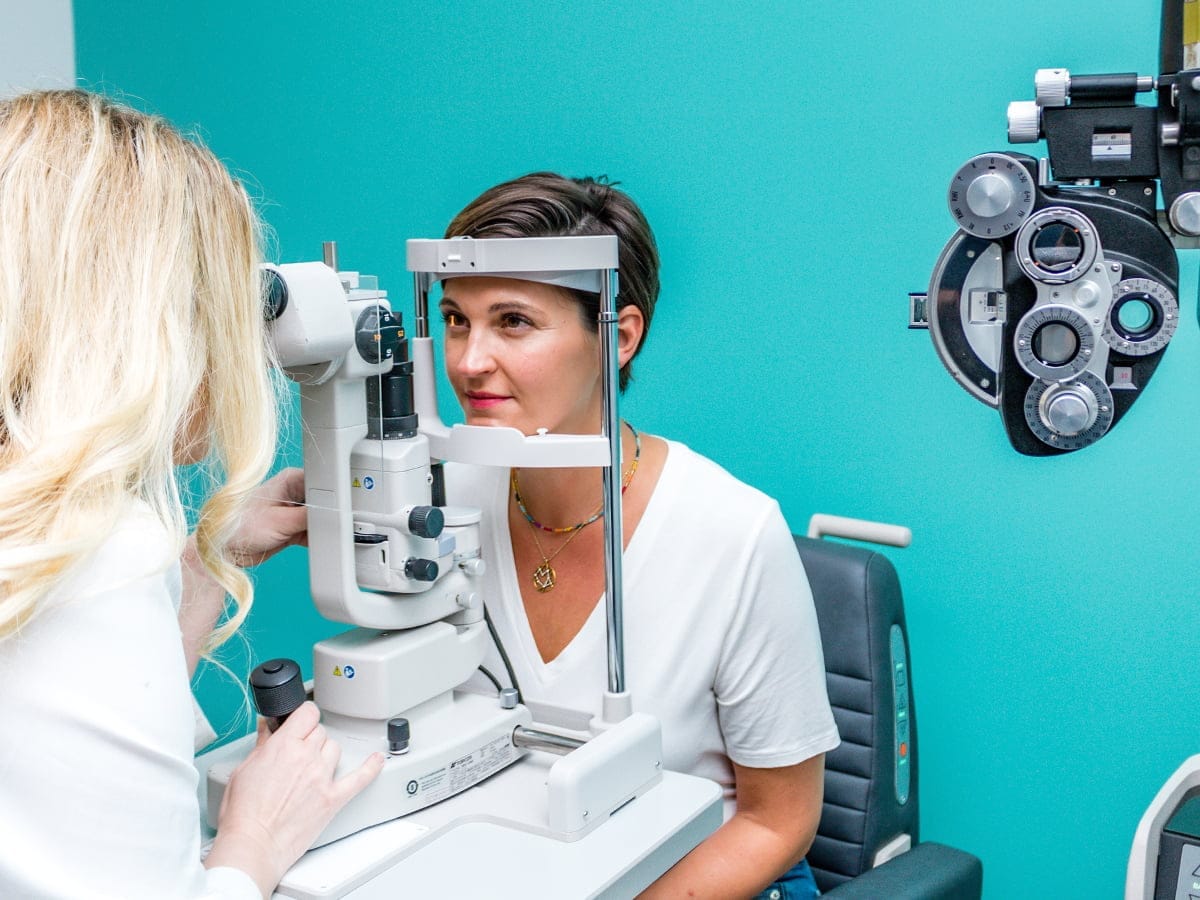What Diseases Can Be Detected During an Eye Exam?
Did you know that your optometrist can detect health conditions that may be in the early stages during a comprehensive eye exam? Because of the delicate structure of the eyes, including nerves, blood vessels, and connective tissues, they can reveal clues about many serious health conditions. Eye exams are not only important for your eye health but play a crucial role in your total body health. So what diseases can be detected during an eye exam? Here are 14 of the many conditions that an eye exam can catch:

Aneurysm
An aneurysm occurs when part of an artery wall weakens, causing it to bulge or widen. The causes of aneurysms are varied and is not always known. In some cases, people are born with them, or they can be hereditary.
During an eye exam, an eye doctor can detect increased pressure in the brain, which could indicate an aneurysm is present. Signs of an aneurysm can include an intense headache on one side or loss of body function. Aneurysms are life-threatening and require immediate medical attention. Learn more about aneurysms on heart.org.
Certain Cancers and Brain Tumors
Many cancers that affect the skin and blood can be found during an eye exam. Certain tumors can spread to the eye and can be spotted during an eye exam. Swelling and increased pressure from brain tumors can affect your vision and be detected by an eye doctor during an eye exam as well.
Diabetes
A routine dilated eye exam will catch diabetes early before you show any symptoms. Nearly 1 in 4 adults living with diabetes are unaware that they have the disease. With diabetes affecting about 30.3 million Americans, the sooner you know the risk, the sooner you can take steps to prevent or manage it.
Prolonged periods of high blood sugar can damage blood vessels in your retina, or in the back of your eye. This condition is known as diabetic retinopathy. Diabetic retinopathy can result in minor or severe changes in vision, and in some cases, lead to blindness. Many diabetics are unaware their eyes are harmed until they visit their eye doctor.
Arthritis
Eye exams are key in early detection of a lot of conditions, including arthritis. One of the earliest signs of Rheumatoid Arthritis is inflammation of the blood vessels in the eyes, which can be seen by eye doctors during an eye exam.
Similarly, Giant Cell Arthritis causes swelling in the neck, upper body, and arms arteries. The lack of blood flow can affect your vision and may cause sudden vision loss. The swelling from GCA can be detected early in an eye exam.
High Blood Pressure
According to the CDC, nearly half of adult Americans have high blood pressure (also called hypertension) and risks for serious health issues are high, including your vision. Ocular hypertension occurs when the pressure in your eyes is above the range considered normal.
Hypertensive Retinopathy occurs when the retinal vessels get damaged due to elevated blood pressure. Eye doctors can diagnose changes in your blood pressure by looking at blood vessels in your eyes during an eye exam.
High Cholesterol
Cholesterol is naturally found in your blood, and we need cholesterol to build healthy cells. Still, high cholesterol levels can cause fatty deposits in your blood vessels, increasing your risk of heart disease or stroke. Your eye doctor can detect high cholesterol by examining the color of your corneas. A yellow or blue ring around your cornea may be a sign you have high cholesterol, especially if you’re under the age of 40.
Lupus
Lupus can affect your eyes in specific ways. People with lupus can experience dry eye, eye pain, and inflammation of the blood vessels. Eye exams play a crucial role in detecting lupus early.
Lyme Disease
Lyme disease is an infection spread by ticks and sometimes can go unnoticed. One way to catch Lyme disease in its early stages is to report any “eye floaters” or eye swelling to your optometrists, so they can investigate further.
Multiple Sclerosis
Multiple Sclerosis is a disease the affects the central nervous system and causes many different symptoms, including vision loss, pain, fatigue, and impaired limb coordination. Inflammation of the optic nerve can cause double vision or blurred vision, which can be an early indicator of multiple sclerosis.
Myasthenia gravis
Myasthenia gravis (MG) is a chronic autoimmune disorder that affects the voluntary muscles of the body, especially those that control the eyes, mouth, throat, and limbs.
STIs
According to the AAO, syphilis, herpes, chlamydia, HIV, gonorrhea, genital warts and pubic lice can all affect layers of the eye. Early signs of these sexually transmitted infections can be found during an eye exam.
Stroke
Your eye doctor can detect blood vessel blockages in the back of your eye, which can indicate a higher risk of stroke. Regular eye exams can help detect a stroke before it happens.
Toxicities from Medications
Several prescription drugs are toxic to the eyes and can cause some irritating symptoms including red, itchy eyes, or conjunctivitis. Certain prescription medications require additional testing to monitor for toxicity in your eye. Keep your eye doctor informed about what medications you’re taking and any symptoms you’re experiencing.
Thyroid Disease
Protruding eyeballs or retracting eyelids are signs of hyperthyroidism. Knowing your history of thyroid conditions will help your eye doctor monitor complications that can arise from high or low thyroid activity.
Early detection is key
Now you know what diseases can be detected in an eye exam. These are just some of the conditions that can be found in a comprehensive eye exam. Please note that one symptom listed for any of these conditions isn’t a guaranteed diagnosis. Whenever an eye exam reveals a possible health problem, your optometrist will refer you to a specialist or your primary care doctor if needed.
If you’re noticing a sudden change in your vision, it’s important to see your eye doctor. Many diseases don’t always have early warning signs, and diagnosing illness through the eye is one way to detect them early and increases the likelihood of preventing vision loss and maintaining your health.
Our dedicated optometrists at Dr. Tavel are here to provide the best, personalized vision health care for you and your family. We accept all vision insurance – including VSP, EyeMed, Spectera, Medicaid, and HIP. Schedule your next eye exam online at drtavel.com.
